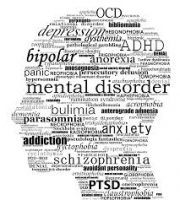
5 Harmful Myths About Mental Illnesses, We Commonly Mistaken

The Myth of mental disease, a book that discussed his belief that mental illnesses were unnecessary diagnoses wont to excuse the behavior of ethical and socially deficient people. While there are still some people that hold this view, the bulk of the general public have a way better understanding of mental illnesses. However, there are still some common myths we can’t seem to urge faraway from which will have harmful effects on the treatment of these with psychological conditions.
1.) People with mental disorders are likely to be violent.
In all actuality, the rates of violence or criminal behavior in people with mental illnesses is extremely small, with the bulk of instances occurring with drug abuse disorders and people with previous histories of violent behavior. In fact, people with a psychological condition are more likely to be the victims of criminal and violent behavior. They’re more likely to experience violence and sexual assault, and they’re also more likely to suffer an intense psychological reaction to being victimized.
2.) People can pull themselves out of a mental disease if they actually need to.
Probably one among the foremost popular myths about mental illnesses, especially when it involves depression and anxiety, is that the person is simply oversensitive and will easily fix the matter. This is often where the phrases “they just want attention,” and “they like feeling miserable,” comes into play. First of all, mental disorders often have genetic factors that influence predisposition and chemical imbalances that can’t be influenced by sheer willpower. Thinking the person affected by the condition is voluntary and caused by some inherent weakness can cause the person to be less likely to hunt some kind of treatment for the condition or maybe to debate their struggle generally, which is extremely harmful to the method of recovery. Secondly, it’s very hard to form the primary step in getting help. From personal experience, the method of getting professional assistance is daunting task. First, you’ve got to figure up the courage to even admit to yourself there’s a significant problem, then there’s trying to seek out a therapist nearby that’s accepting new clients and works together with your insurance. Then, it’s an attempt and error process of therapy techniques and medications which will take a substantial amount of your time. Some people prefer to handle the matter on their own, which is entirely their decision—there is completely no benefit to either pressuring someone to travel to therapy or telling them to only recover from it.
3.) Love and support are absolutely the cures to mental disease.
Every therapist and doctor will tell you that social support may be a vital factor when it involves the recovery process, but it’s not the sure fire thanks to fix someone’s mental disease. We’ve all seen movies where a toddler with a significant behavioral problem or a woman who suffers from emotional outbursts is formed completely better by the top of the movie because someone went out of their thanks to inspire a sudden realization that they will be loved. However, if you expect this to happen in real world, you’re likely to be thoroughly disappointed. Key features of several mental illnesses include social isolation and constant fear of rejection. While showing someone you continue to care about them and are willing to remain beside them through their struggle is strongly encouraged, people that suffer from a mental disease may have a tough time believing those actions within the first place, much less showing some kind of appreciation for them.
4.) Having a mental disease may be a social death sentence.
As mentioned above, there are still some stigmas about mental disorders that are a touch unsettling. However, it’s important to notice that the general tone of the reception of these who struggle with some sort of psychological condition is shifting towards a more positive one. With the spreading knowledge of genetic predispositions and chemical imbalances, mental disorders have began to carry a way of blamelessness, making them more “acceptable” than physical illnesses in some cases.
5.) You’ll become your label.
This is an enormous fear whenever it involves making the choice to travel to a psychological state professional. Rather than an individual, they become a borderline, a manic-depressive, an anorexic, a schizophrenic, the list goes on and on. With this comes the sensation that whatever mental disease is present becomes everything of who the person is; the disorder has completely appropriated. I could write pages and pages about the advantages of Rogerian-based therapy, but the essential idea is there can’t be any kind of success out of a therapy session where the client finishes up feeling like they aren’t seen and valued as an individual. Rogerian therapists have an enormous push for person-first terminology. Rock bottom line is every mental disease exists on a spectrum. Everyone experiences them differently, and if a client feels the mental disturbance itself is that the only thing his/her therapist or doctor is concentrated on, it’s highly recommended they find a replacement one.
9 Things to not tell Someone with mental disease –
- “Get busy, and distract yourself.”
- “Do you would like to urge better?”
- “Change your attitude.”
- “Stop that specialize in the bad stuff, and just start living.”
- “You have everything you would like to urge better.”
- “You can snap out of it. Everyone feels this manner sometimes.”
- “Just pray about it.”
- “Why can’t you work?”
- “You have an equivalent illness as my ______.”

good post
Thanks